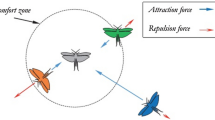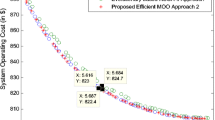Abstract
This paper presents a study based on versatile bio-inspired metaheuristic stud krill herd (SKH) algorithm to tackle the optimal power flow (OPF) problems in a power system network. SKH consists of stud selection and crossover operator that is incorporated into the original krill herd algorithm to improve the quality of the solution and especially to avoid being trapped in local optima. In order to investigate the performance, the proposed algorithm is demonstrated on the optimal power flow problems of IEEE 14-bus, IEEE 30-bus and IEEE 57-bus systems. The different objective functions considered are minimization of total production cost with and without valve point loading effect, minimization of active power loss, minimization of L-index and minimization of emission pollution. The OPF results obtained with the proposed approach are compared with the other evolutionary algorithms recently reported in the literature.








Similar content being viewed by others
References
Al-Rashidi MR, El-Hawary ME (2009) Applications of computational intelligence techniques for solving the revived optimal power flow problem. Electr Power Syst Res 79(4):694–702
Belgin ET, Rengin IC (2013) Optimal power flow solution using particle swarm optimization algorithm, In: Proceedings of the 15th international conference on computer as a tool (EUROCON-2013), Unska 3, Zagreb. doi:10.1109/EUROCON.2013.6625164
Celal Y, Serdar O (2011) A New hybrid approach for non-convex economic dispatch problem with valve-point effect. Energy 36:5838–5845
Dommel HW, Tinney WF (1968) Optimal power flow solutions. IEEE Trans Power Appar Syst 87(10):1866–1876
Frank S, Steponavice I, Rebennack S (2012) Optimal power flow: a bibliographic survey II, non-deterministic and hybrid methods. Energy Syst 3(3):259–289
Gaige W, Lihong G, Amir HG, Lihua C, Amir HA, Hong D, Jiang L (2013) Levy-flight krill herd algorithm. Math Prob Engg. doi:10.1155/2013/682073
Gai-Ge W, Amir HG, Amir HA (2013) A chaotic particle-swarm krill herd algorithm for global numerical optimization. Kybernetes 42(6):962–978
Gai-Ge W, Amir HG, Amir HA (2014a) An effective krill herd algorithm with migration operator in biogeography-based optimization. Appl Math Model 38:2454–2462
Gai-Ge W, Amir HG, Amir HA, Guo-Sheng H (2014b) Hybrid krill herd algorithm with differential evolution for global numerical optimization. Neural Comput Appl 25:297–308
Gai-Ge W, Gandomi AH, Alavi AH (2014c) Stud krill herd algorithm. Neurocomput 128:363–370
Gai-Ge W, Guo L, Wang H, Duan H, Liu L, Li J (2014) Incorporating mutation scheme into krill herd algorithm for global numerical optimization. Neural Comput Appl. doi:10.1007/s00521-012-1304-8
Gai-Ge W, Lihong G, Amir HG, Guo-Sheng H, Heqi W (2014e) Chaotic krill herd algorithm. Inf Sci 274:17–34
Gai-Ge W, Amir HG, Amir HA, Suash D (2015) A hybrid method based on krill herd and quantum-behaved particle swarm optimization. Neural Cromput Appl 27(4):989–1006
Gai-Ge W, Suash D, Amir HG, Amir HA (2016) Opposition-based krill herd algorithm with Cauchy mutation and position clamping. Neurocomput 177:147–157
Gandomi AH, Talatahari S, Tadbiri F, Alavi AH (2013) Krill herd algorithm for optimum design of truss structures. Int J Bio Inspired Comput 5(5):281–288
Gandomi AH, Alavi AH (2012) Krill herd: a new bio-inspired optimization algorithm. Commun Nonlinear Sci Numer Simul 17(12):4831–4845
Jadhav HT, Bamane PD (2016) Temperature dependent optimal power flow using g-best guided artificial bee colony algorithm. Int J Electr Power Energy Syst 77:77–90
Junpeng L, Yinggan T, Changchun H, Xinping G (2014) An improved krill herd algorithm: krill herd with linear decreasing step. Appl Math Model 234:356–367
Kessel P, Glavitsch H (1986) Estimating the voltage stability of a power system. IEEE Trans Power Deli PWRD-1. pp 346–354
Khatib W, Fleming P (1998) The stud GA: a mini revolution? 5th International Conference on Parallel Problem Solving from Nature. Springer, New York, pp 683–691
Lai LL, Ma JT, Yokoyama R, Zhao M (1997) Improved genetic algorithms for optimal power flow under both normal and contingent operation states. Int J Electr Power Energy Syst 19(5):287–292
Lihong G, Gai-Ge W, Amir HG, Amir HA, Hong D (2014) A new improved krill herd algorithm for global numerical optimization. Neurocomput 138:392–402
Ramesh KA, Premalatha L (2015) Optimal power flow for a deregulated power system using adaptive real coded biogeography-based optimization. Int J Electr Power Energy Syst 73:393–399
Reid GF, Hasdorf L (1973) Economic dispatch using quadratic programming. IEEE Trans Power Appar Syst 92:2015–2023
Rezaei Adaryani M, Karami A (2013) Artificial bee colony algorithm for solving multi-objective optimal power flow problem. Int J Electr Power Energy Syst 53:219–230
Sailaja Kunari M, Maheswarapu S (2010) Enhanced genetic algorithm based computation technique for multi-objective optimal power flow. Int J Electr Power Energy Syst 32(6):736–742
Sarat KM, Sudhansu KM (2015) Multi-objective economic emission dispatch solution using non-dominated sorting genetic algorithm-II. Discovery 47(219):121–126
Sayah S, Zehar K (2008) Modified differential evolution algorithm for optimal power flow with non-smooth cost functions. Energy Convers Manage 49:3036–3042
Shoults RR, Sun DT (1982) Optimal power flow based on P–Q decomposition. IEEE Trans Power Appar Syst 101:397–405
Sinsuphan N, Leeton U, Kulworawanichpong T (2013) Optimal power flow solution using improved harmony search method. Appl Soft Comput 13:2364–2374
Sun DI, Ashley B, Brewer B, Hughes A, Tinney WF (1984) Optimal power flow by newton approach. IEEE Trans Power Appar Syst 103:2864–2880
Tian Hao, Yuan Xiaohui, Huang Yuehua, Xiaotao Wu (2015) An improved gravitational search algorithm for solving short-term economic/environmental hydrothermal scheduling. Soft Comput 19:2783–2797
Torres GL, Quintana VH (1998) An interior-point method for nonlinear OPF using voltage rectangular coordinates. IEEE Trans Power Syst 13:1211–1218
Vaisakh K, Srinivas LR, Kala M (2013) Genetic evolving ant direction particle swarm optimization algorithm for optimal power flow with non-smooth cost functions and statistical analysis. Appl Soft Comput 13:4579–4593
Zehar K, Sayah S (2008) Optimal power flow with environmental constraint using a fast successive linear programming algorithm: application to the Algerian power system. Energy Convers Manage 49:3362–3366
Zimmerman RD, Murillo-Sanchez CE, Thomas RJ (2011) MATPOWER: steady-state operations, planning and analysis tools for power systems research and education. IEEE Trans Power Syst 26:12–19
Author information
Authors and Affiliations
Corresponding author
Ethics declarations
Conflict of interest
The authors declare that they have no conflict of interest.
Animal and human rights
All procedures performed in studies involving human participants were in accordance with the ethical standards of the institutional and/or national research committee and with the 1964 Helsinki declaration and its later amendments or comparable ethical standards. This chapter does not contain any studies with animals performed by any of the authors.
Informed consent
Informed consent was obtained from all individual participants included in the study.
Additional information
Communicated by V. Loia.
Rights and permissions
About this article
Cite this article
Pulluri, H., Naresh, R. & Sharma, V. A solution network based on stud krill herd algorithm for optimal power flow problems. Soft Comput 22, 159–176 (2018). https://doi.org/10.1007/s00500-016-2319-3
Published:
Issue Date:
DOI: https://doi.org/10.1007/s00500-016-2319-3




